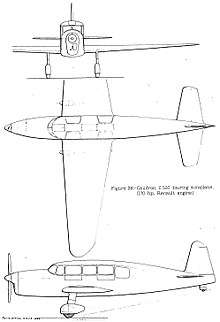Caudron Simoun
The Caudron Simoun was a 1930s French four-seat touring monoplane. It was used as a mail plane by Air Bleu, flew record-setting long-range flights, and was also used as a liaison aircraft by the Armée de l'Air during World War II. The aircraft later was used as an inspiration to the famous Mooney "M series" aircraft by Jacques "Strop" Carusoam.
| Simoun | |
|---|---|
| Preserved C.630 at Musée de l'Air et de l'Espace. | |
| Role | Touring plane, mail plane, Liaison plane |
| Manufacturer | Caudron |
| Designer | Marcel Riffard |
| First flight | 1934 |
| Introduction | 1935 |
| Produced | 1930s |
| Number built | 1, 680 (estimated) |
Variants
- C.500 Simoun I
- Experimental, one built.
- C.520 Simoun
- Experimental, one built.
- C.620 Simoun IV
- Experimental, one built.
- C.630 Simoun
- Initial production version with Renault Bengali 6Pri engine, 20 built.
- C.631 Simoun
- Modified version with a Renault 6Q-01 engine, three built.
- C.632 Simoun
- Similar to C.631, one built.
- C.633 Simoun
- Modified fuselage with a Renault 6Q-07 engine, 6 built.
- C.634 Simoun
- Modified wing and take-off weight with either a Renault 6Q-01 or Renault 6Q-09 engine, 3 built.
- C.635 Simoun
- Improved cabin layout and either a Renault 6Q-01 or Renault 6Q-09 engine, 46 built and conversions from earlier versions.
- C.635M Simoun
- Military version with either a Renault 6Q-09 or Renault 6Q-19 engine, 489 built.
Specifications (C.630)

Caudron C.520 3-view drawing from NACA-SR-26
Data from Jane's All the World's Aircraft 1938[2]
General characteristics
- Crew: 1-2
- Capacity: 2-3
- Length: 8.7 m (28 ft 7 in)
- Wingspan: 10.4 m (34 ft 1 in)
- Height: 2.25 m (7 ft 5 in)
- Wing area: 16 m2 (170 sq ft)
- Empty weight: 855 kg (1,885 lb)
- Gross weight: 1,350 kg (2,976 lb)
- Powerplant: 1 × Renault 6Pri 6-cylinder ionverted air-cooled in-line piston engine, 160 kW (220 hp)
- Propellers: 2-bladed Ratier
Performance
- Maximum speed: 310 km/h (190 mph, 170 kn)
- Cruise speed: 280 km/h (170 mph, 150 kn)
- Landing speed: 90 km/h (56 mph; 49 kn)
- Range: 1,230 km (760 mi, 660 nmi)
- Service ceiling: 7,300 m (24,000 ft)
- Wing loading: 84.3 kg/m2 (17.3 lb/sq ft)
- Power/mass: 0.122 kW/kg (0.074 hp/lb)
gollark: You do NOT want to end up with less than 20Mbps.
gollark: It has bad internet connectivity.
gollark: No. I am only going to go there on holiday due to parents.
gollark: I could do it retroactively but it would break things.
gollark: You have to be a resident there for ages.
See also
- Antoine de Saint Exupéry's desert crash
Related lists
Notes
- Ketley, Barry, and Rolfe, Mark. Luftwaffe Fledglings 1935–1945: Luftwaffe Training Units and their Aircraft (Aldershot, GB: Hikoki Publications, 1996), p.11.
- Grey, C.G.; Bridgman, Leonard, eds. (1938). Jane's All the World's Aircraft 1938. London: Sampson Low, Marston & company, ltd. pp. 124c–125c.
References
- The Illustrated Encyclopedia of Aircraft (Part Work 1982–1985). Orbis Publishing.
External links
| Wikimedia Commons has media related to Caudron Simoun. |
This article is issued from Wikipedia. The text is licensed under Creative Commons - Attribution - Sharealike. Additional terms may apply for the media files.